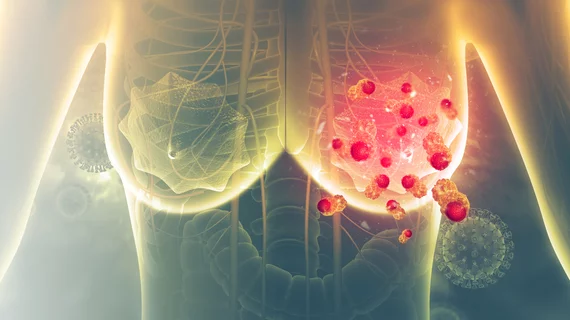AI triage tool cuts radiologists’ mammography workload by more than 50%
Using a commercially available artificial intelligence tool to triage mammograms can detect cancers earlier and offers substantial relief to busy radiologists.
That’s according to new research out of Stockholm, Sweden, shared Sept. 1 in The Lancet Digital Health. There have been a number of cancer-detection algorithms created for mammography, but unlike those, this tool acts as an independent reader.
And in situations where AI deemed a scan low-risk for breast cancer, the software could have eliminated the need for radiologists’ eyes in more than 50% of such exams, without missing any cancers. In the small group of women with the highest scores, AI could have spotted 27% of ensuing cancers.
“Commercial AI algorithms as independent readers of screening mammography assessment are now performing on a clinically relevant level,” Karin Dembrower, MD, with Capio Sankt Görans Hospital, and colleagues noted. “AI-based scoring can be used to reallocate radiologist time from clearly negative mammograms towards cases where cancer might go undetected. AI has the potential to promote early detection and thereby increase overall survival for breast cancer patients.”
For their retrospective simulation study, the team included 7,364 women ages 40 to 47. Of them, 547 had breast cancer and 6,817 were healthy individuals.
They tested two situations. In the first, the algorithm predicted a scan was normal and did not require a radiologists’ interpretation. The second involved scans deemed normal after double reading, but received an AI-assigned high-risk score conveying the need for follow-up MRI.
In the 60%, 70%, and 80% of women with the lowest AI scores and no rad reading, 0%, 0.3%, and 2.6% of cancers would have been missed, respectively.
Alternatively, in the 1% and 5% of women with the highest risk-score, 12% and 27% of the next 200 interval cancers would have been detected, respectively. In those two same high-risk groups, 14% and 25% of the subsequent 347 cancers would have been detected in the follow-up screening round.
“Using a commercial AI cancer detector to triage mammograms into no radiologist assessment and enhanced assessment could potentially reduce radiologist workload by more than half, and pre-emptively detect a substantial proportion of cancers otherwise diagnosed later,” the group concluded.
Read the study in further detail here.

